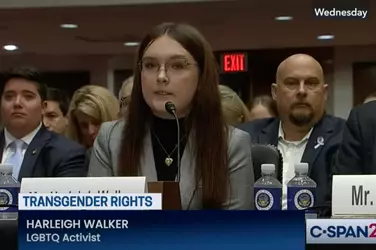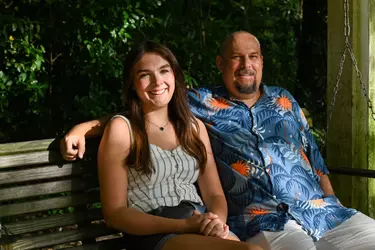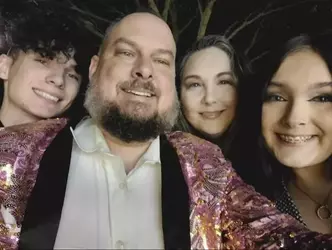https://19thnews.org/2025/07/transgender-teenager-life-trump-america/
https://archive.is/7XaYQ
Previous thread by @CatParty Here

Harleigh Walker near her home in Auburn. (JULIE BENNETT FOR TRADEOFFS)
Ryan Levi and Dan Gorenstein, Tradeoffs
Published
July 23, 2025, 10:43 a.m. PT
Republish this story
It’s been a hard year for transgender Americans and their supporters.
President Donald Trump has issued numerous executive orders targeting transgender people and their health care. The administration has threatened hospitals, shuttered the federal suicide and crisis hotline for LGBTQ+ youth and, earlier this month, the Department of Justice subpoenaed confidential patient information from doctors who treat transgender young people.
As a result of this federal pressure, some hospitals in liberal states have stopped providing gender-affirming care for trans patients.
And in June, the Supreme Court upheld Tennessee’s right to ban that care for transgender minors. An estimated 112,000 transgender teens live in Tennessee or one of 24 other states with similar bans. This Supreme Court decision means those young people will continue to either have to travel out of state or go without care — care that the American Medical Association, American Academy of Pediatrics and other major medical groups in the United States consider medically necessary and potentially lifesaving.
Eighteen-year-old Harleigh Walker is one of the young people who has to drive hours across state lines for health care. Even though her home state of Alabama was one of the first to ban gender-affirming care for minors, the new administration has made life much harder for her and her family, she said this week in an interview with the health policy news organization Tradeoffs.
“There’s really no safety in the country [for transgender people],” Harleigh said. “I feel unsafe almost everywhere. It’s really scary.”
It’s been scary for her dad, Jeff Walker, too.
“After the inauguration,” Jeff told us, “with every car that drove down the street, I had this crazy fear that it was someone coming to try and take Harleigh away from us as parents. Because that’s kind of some of the stuff you were hearing, right? ‘These parents should be put in jail. These parents should be gone after for what they’re doing to these kids.’ ”
The Walkers spoke with Tradeoffs from the family’s home just a few miles from Auburn University, and shared how life has changed for them this year.
The following highlights from that conversation have been edited for length and clarity:
On how life feels different under the second Trump administration:
Harleigh: I always said that no matter how unsafe I felt in my home state or how many states passed this anti-trans legislation or spewed this rhetoric, I felt a safeguard in the federal government. And having a president that would get out on Transgender Day of Visibility and say, “Transgender Americans, I see you, I’m here for you, I support you.” Even though there wasn’t federal legal protection or anything like that, I knew that the federal government wasn’t going to come after me and my community.
And then, as soon as Trump won the election, I knew that was all going to change. And so there’s been a shift — and a lot more focus now on trans people. … People are [allowed] to have more hate, to spew their hate.

Harleigh Walker and her father Jeff Walker are photographed Wednesday, July 9, 2025, in Auburn, Ala. (Photo by Julie Bennett) IMAGE COURTESY OF C-SPAN
On the ways her perspective has shifted since a 2023 hearing where she testified before the U.S. Senate Judiciary Committee on transgender rights:
Harleigh: So much has changed. I had so much hope back then. If I could tell that Harleigh, from two years ago, what has happened with Trump winning the election and the Supreme Court case that just came out, she’d be devastated. It’s not to say I don’t have hope anymore, but it’s to say that my attitude has changed in a lot of regards. I feel a lot more pressure to act individually, and I don’t feel like I have the same amount of support at my back as I did in that moment.
Jeff: When Harleigh gave that [testimony], she could still get health care in the state of Alabama at that time. It was not until about six months later that the injunction was lifted and they fully banned health care here in the state. So I think Harleigh is right that since she [took part in] that discussion at the Senate Judiciary, so much has changed for us as a family, for her as an individual. And it’s gone the opposite direction we were hoping for.
On the ways anti-trans laws limit Harleigh’s college choices:
Jeff: I’ve always wanted one of my kids to go to Auburn. But we knew pretty quickly that that wasn’t an opportunity for Harleigh. It’s not safe for her in this state. Our state leaders don’t want her in this state, and they’ve made that abundantly clear. Lots of kids go far away for college, and I know that’s pretty normal. But for me, my kid didn’t have a choice to go here locally. So she’s moving over 10 hours away from us to go to college. And that kind of sucks.
Harleigh: Almost 90 percent of my graduating class is going to Auburn University. My best friend, she’s going to Auburn University. I could never think about going to college with my best friend because of how the state legislators have forcibly shut out trans people and their families.
I love living in Alabama. I’ve grown up here all my life. And I couldn’t think about going to Auburn University at all. I couldn’t think about continuing on that life here. I’m going to go live my life wherever I end up happy — and continue being who I am. But that place, unfortunately, won’t be Alabama. And that’s the product of the state legislators here at home.

Harleigh Walker and her father Jeff Walker are photographed Wednesday, July 9, 2025, in Auburn, Ala. (Photo by Julie Bennett) JULIE BENNETT/TRADEOFFS
On their advice to parents struggling with how best to help and support a child who is transgender:
Jeff: One of the statistics we read early on was there was a high suicide ratefor trans youth, especially trans youth who didn’t have supportive families. So Harleigh’s mom and I very quickly made sure not just that she knew that wesupported her, but that everyone knew we were all going to support Harleigh — or you’re not going to be a part of this family. To me, it’s not hard to do. You love your kid. Just listen to what they have to say and support them. I know it seems much harder than it really is, but it really is that simple.
Harleigh: We honestly really didn’t know what to expect [when we went to our first doctor’s visit after I came out]. We were all kind of nervous. But then we sat down with the doctors and immediately felt comfortable. It often gets [portrayed] that you immediately go to the doctor and it’s hormones, puberty blockers, surgeries. That’s so far from the truth. Those first few visits are just [the doctors] getting to know you. [They ask], “What can we do to help you with your journey?” and “What’s the best thing for you and your family going forward?” And so I think we left that first meeting feeling really affirmed and like I was seen as a person.
I think the biggest thing is just listening. A lot of people don’t listen like my parents did. My dad grew up in the South — Christian, small town. He didn’t know what being transgender meant. But he was still willing to listen. And now my dad is my biggest supporter. And just seeing his growth the past few years since I’ve come out has been truly inspiring. And I’m forever grateful.

Jeff and Harleigh Walker take a selfie as they head to the Taylor Swift concert in Atlanta. IMAGE COURTESY OF JEFF WALKER
On the importance of seizing happiness, even in the midst of increased political attacks:
Harleigh: Whenever people talk about trans youth, people get caught up in the negativity and the sorrow. And I think there’s a lot of joy. I always say, “I’m Harleigh, I’m not trans Harleigh, I’m just Harleigh.” I have so many other parts of my life other than being transgender. I’m not miserable. I live a great life. I live a happy life. And a lot of people don’t know that. That’s why I wish people would not look at trans people as a talking point, but as people.
On what is bringing them joy right now:
Jeff: Harleigh is so busy with her friends all the time. A lot of times they come here to the house, and I’ll get pizza or whatever, and they’ll sit downstairs and watch movies. When I’ve got a house full of kids that are downstairs giggling and doing karaoke and cackling and cutting up — you can’t help but be happy, to see your kids happy like that. So I’m really enjoying that.
Harleigh: We’re going to be traveling up to Maryland soon for my college orientation. And I always love traveling with my dad. Every time we travel, he’ll always take a selfie of us before we leave and be like, “Jeff and Harleigh going on a new adventure. Where are we going now?” I’m just excited to spend the last few months home in Auburn with my family — and soak it all in before I leave.
This story was originally produced by Tradeoffs, a nonprofit newsroom reporting on health care’s toughest choices. Sign up for their weekly newsletter to get their latest stories every Thursday morning.

In an undated photo provided by Jeff Walker, Robert, Jeff, Lisa and Harleigh Walker are shown.
https://archive.is/7XaYQ
Previous thread by @CatParty Here

Harleigh Walker near her home in Auburn. (JULIE BENNETT FOR TRADEOFFS)
Ryan Levi and Dan Gorenstein, Tradeoffs
Published
July 23, 2025, 10:43 a.m. PT
Republish this story
It’s been a hard year for transgender Americans and their supporters.
President Donald Trump has issued numerous executive orders targeting transgender people and their health care. The administration has threatened hospitals, shuttered the federal suicide and crisis hotline for LGBTQ+ youth and, earlier this month, the Department of Justice subpoenaed confidential patient information from doctors who treat transgender young people.
As a result of this federal pressure, some hospitals in liberal states have stopped providing gender-affirming care for trans patients.
And in June, the Supreme Court upheld Tennessee’s right to ban that care for transgender minors. An estimated 112,000 transgender teens live in Tennessee or one of 24 other states with similar bans. This Supreme Court decision means those young people will continue to either have to travel out of state or go without care — care that the American Medical Association, American Academy of Pediatrics and other major medical groups in the United States consider medically necessary and potentially lifesaving.
Eighteen-year-old Harleigh Walker is one of the young people who has to drive hours across state lines for health care. Even though her home state of Alabama was one of the first to ban gender-affirming care for minors, the new administration has made life much harder for her and her family, she said this week in an interview with the health policy news organization Tradeoffs.
“There’s really no safety in the country [for transgender people],” Harleigh said. “I feel unsafe almost everywhere. It’s really scary.”
It’s been scary for her dad, Jeff Walker, too.
“After the inauguration,” Jeff told us, “with every car that drove down the street, I had this crazy fear that it was someone coming to try and take Harleigh away from us as parents. Because that’s kind of some of the stuff you were hearing, right? ‘These parents should be put in jail. These parents should be gone after for what they’re doing to these kids.’ ”
The Walkers spoke with Tradeoffs from the family’s home just a few miles from Auburn University, and shared how life has changed for them this year.
The following highlights from that conversation have been edited for length and clarity:
On how life feels different under the second Trump administration:
Harleigh: I always said that no matter how unsafe I felt in my home state or how many states passed this anti-trans legislation or spewed this rhetoric, I felt a safeguard in the federal government. And having a president that would get out on Transgender Day of Visibility and say, “Transgender Americans, I see you, I’m here for you, I support you.” Even though there wasn’t federal legal protection or anything like that, I knew that the federal government wasn’t going to come after me and my community.
And then, as soon as Trump won the election, I knew that was all going to change. And so there’s been a shift — and a lot more focus now on trans people. … People are [allowed] to have more hate, to spew their hate.

Harleigh Walker and her father Jeff Walker are photographed Wednesday, July 9, 2025, in Auburn, Ala. (Photo by Julie Bennett) IMAGE COURTESY OF C-SPAN
On the ways her perspective has shifted since a 2023 hearing where she testified before the U.S. Senate Judiciary Committee on transgender rights:
Harleigh: So much has changed. I had so much hope back then. If I could tell that Harleigh, from two years ago, what has happened with Trump winning the election and the Supreme Court case that just came out, she’d be devastated. It’s not to say I don’t have hope anymore, but it’s to say that my attitude has changed in a lot of regards. I feel a lot more pressure to act individually, and I don’t feel like I have the same amount of support at my back as I did in that moment.
Jeff: When Harleigh gave that [testimony], she could still get health care in the state of Alabama at that time. It was not until about six months later that the injunction was lifted and they fully banned health care here in the state. So I think Harleigh is right that since she [took part in] that discussion at the Senate Judiciary, so much has changed for us as a family, for her as an individual. And it’s gone the opposite direction we were hoping for.
On the ways anti-trans laws limit Harleigh’s college choices:
Jeff: I’ve always wanted one of my kids to go to Auburn. But we knew pretty quickly that that wasn’t an opportunity for Harleigh. It’s not safe for her in this state. Our state leaders don’t want her in this state, and they’ve made that abundantly clear. Lots of kids go far away for college, and I know that’s pretty normal. But for me, my kid didn’t have a choice to go here locally. So she’s moving over 10 hours away from us to go to college. And that kind of sucks.
Harleigh: Almost 90 percent of my graduating class is going to Auburn University. My best friend, she’s going to Auburn University. I could never think about going to college with my best friend because of how the state legislators have forcibly shut out trans people and their families.
I love living in Alabama. I’ve grown up here all my life. And I couldn’t think about going to Auburn University at all. I couldn’t think about continuing on that life here. I’m going to go live my life wherever I end up happy — and continue being who I am. But that place, unfortunately, won’t be Alabama. And that’s the product of the state legislators here at home.

Harleigh Walker and her father Jeff Walker are photographed Wednesday, July 9, 2025, in Auburn, Ala. (Photo by Julie Bennett) JULIE BENNETT/TRADEOFFS
On their advice to parents struggling with how best to help and support a child who is transgender:
Jeff: One of the statistics we read early on was there was a high suicide ratefor trans youth, especially trans youth who didn’t have supportive families. So Harleigh’s mom and I very quickly made sure not just that she knew that wesupported her, but that everyone knew we were all going to support Harleigh — or you’re not going to be a part of this family. To me, it’s not hard to do. You love your kid. Just listen to what they have to say and support them. I know it seems much harder than it really is, but it really is that simple.
Harleigh: We honestly really didn’t know what to expect [when we went to our first doctor’s visit after I came out]. We were all kind of nervous. But then we sat down with the doctors and immediately felt comfortable. It often gets [portrayed] that you immediately go to the doctor and it’s hormones, puberty blockers, surgeries. That’s so far from the truth. Those first few visits are just [the doctors] getting to know you. [They ask], “What can we do to help you with your journey?” and “What’s the best thing for you and your family going forward?” And so I think we left that first meeting feeling really affirmed and like I was seen as a person.
I think the biggest thing is just listening. A lot of people don’t listen like my parents did. My dad grew up in the South — Christian, small town. He didn’t know what being transgender meant. But he was still willing to listen. And now my dad is my biggest supporter. And just seeing his growth the past few years since I’ve come out has been truly inspiring. And I’m forever grateful.

Jeff and Harleigh Walker take a selfie as they head to the Taylor Swift concert in Atlanta. IMAGE COURTESY OF JEFF WALKER
On the importance of seizing happiness, even in the midst of increased political attacks:
Harleigh: Whenever people talk about trans youth, people get caught up in the negativity and the sorrow. And I think there’s a lot of joy. I always say, “I’m Harleigh, I’m not trans Harleigh, I’m just Harleigh.” I have so many other parts of my life other than being transgender. I’m not miserable. I live a great life. I live a happy life. And a lot of people don’t know that. That’s why I wish people would not look at trans people as a talking point, but as people.
On what is bringing them joy right now:
Jeff: Harleigh is so busy with her friends all the time. A lot of times they come here to the house, and I’ll get pizza or whatever, and they’ll sit downstairs and watch movies. When I’ve got a house full of kids that are downstairs giggling and doing karaoke and cackling and cutting up — you can’t help but be happy, to see your kids happy like that. So I’m really enjoying that.
Harleigh: We’re going to be traveling up to Maryland soon for my college orientation. And I always love traveling with my dad. Every time we travel, he’ll always take a selfie of us before we leave and be like, “Jeff and Harleigh going on a new adventure. Where are we going now?” I’m just excited to spend the last few months home in Auburn with my family — and soak it all in before I leave.
This story was originally produced by Tradeoffs, a nonprofit newsroom reporting on health care’s toughest choices. Sign up for their weekly newsletter to get their latest stories every Thursday morning.

In an undated photo provided by Jeff Walker, Robert, Jeff, Lisa and Harleigh Walker are shown.